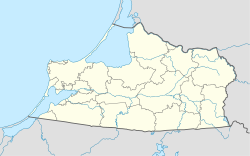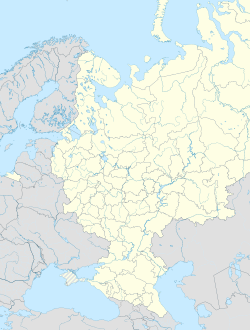world.wikisort.org - Russia
Bolshakovo (Russian: Большако́во, Polish: Skajzgiry, Lithuanian: Didieji Skaisgiriai, German: Groß Skaisgirren or Kreuzingen (1938-1946)), also referred to as Bolshakovo-Novoye (Russian: Большако́во-Новое), is a settlement located in the southern part of Slavsky District of Kaliningrad Oblast, Russia, 90 km from Kaliningrad. The adjective "Novoye" (new) is sometimes used to distinguish it from an eponymous village in Ivanovo Oblast of Russia.
Bolshakovo
Большако́во | |
|---|---|
Rural locality | |
 Train station in Bolshakovo (Novoye) | |
Location of Bolshakovo  | |
 Bolshakovo Location of Bolshakovo  Bolshakovo Bolshakovo (European Russia)  Bolshakovo Bolshakovo (Russia) | |
| Coordinates: 54°52′49″N 21°39′11″E | |
| Country | Russia |
| Federal subject | Kaliningrad Oblast |
| Administrative district | Slavsky District |
| Elevation | 17 m (56 ft) |
| Population | |
| • Total | 2,448 |
| Time zone | UTC+2 (MSK–1 |
| Postal code(s)[3] | |
| OKTMO ID | 27727000136 |
It is situated on the road from Talpaki to Sovetsk. There are also roads from Bolshakovo to Polessk and to Chernyakhovsk. Bolshakovo is a railway station on the Kaliningrad–Sovetsk line.
Bolshakovo lies on the border of Polessk Lowland in a marsh landscape and has approximately 2,000 inhabitants.
Bolshakovo is a transmission site of the Voice of Russia broadcasting station, the Bolshakovo transmitter.
History
In 1454, the region was incorporated by King Casimir IV Jagiellon to the Kingdom of Poland upon the request of the anti-Teutonic Prussian Confederation.[4] After the subsequent Thirteen Years' War, since 1466, it formed part of Poland as a fief held by the Teutonic Order,[5] and from 1525 held by Ducal Prussia. From the 18th century it was part of the Kingdom of Prussia, and from 1871 to 1945 it was also part of Germany, within which it was administratively located in the Landkreis Elchniederung (district) in the Province of East Prussia. In the late 19th century, the village had 147 houses and 731 inhabitants.[6] The population was employed in agriculture and cattle and horse breeding.[6] In 1938, during a massive Nazi campaign of renaming of placenames, it was renamed to Kreuzingen to erase traces of Lithuanian origin. Until the end of World War II, the biggest livestock railway station of Germany was located there. Following the war, it fell to the Soviet Union.
References
- Russian Federal State Statistics Service (2011). Всероссийская перепись населения 2010 года. Том 1 [2010 All-Russian Population Census, vol. 1]. Всероссийская перепись населения 2010 года [2010 All-Russia Population Census] (in Russian). Federal State Statistics Service.
- "Об исчислении времени". Официальный интернет-портал правовой информации (in Russian). 3 June 2011. Retrieved 19 January 2019.
- Почта России. Информационно-вычислительный центр ОАСУ РПО. (Russian Post). Поиск объектов почтовой связи (Postal Objects Search) (in Russian)
- Górski, Karol (1949). Związek Pruski i poddanie się Prus Polsce: zbiór tekstów źródłowych (in Polish). Poznań: Instytut Zachodni. p. 54.
- Górski, p. 96–97, 214–215
- Słownik geograficzny Królestwa Polskiego i innych krajów słowiańskich, Tom X (in Polish). Warszawa. 1889. p. 635.
External links
На других языках
- [en] Bolshakovo
[ru] Большаково (Калининградская область)
Большако́во (до 1938 года — Гросс Скайсгиррен, нем. Groß Skaisgirren}, в 1938—1947 годах — Кройцинген, нем. Kreuzingen) — самый крупный посёлок сельского типа в Славском районе Калининградской области, приблизительно в девяноста километрах от Калининграда. Административный центр Большаковского сельского поселения.Другой контент может иметь иную лицензию. Перед использованием материалов сайта WikiSort.org внимательно изучите правила лицензирования конкретных элементов наполнения сайта.
WikiSort.org - проект по пересортировке и дополнению контента Википедии